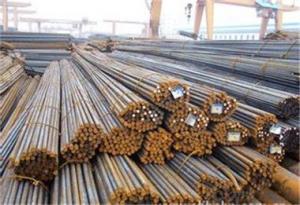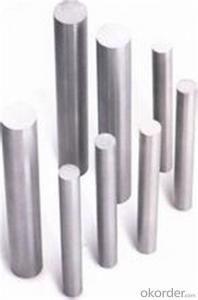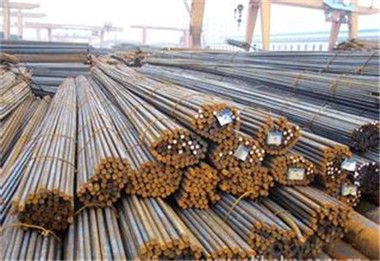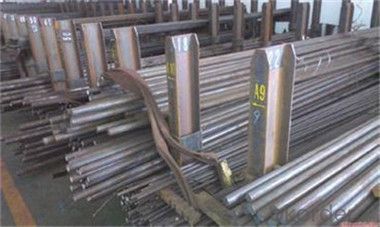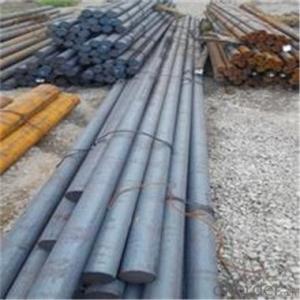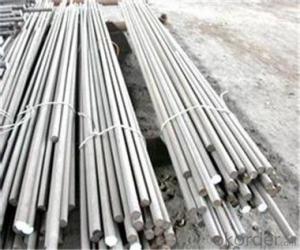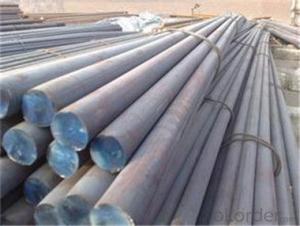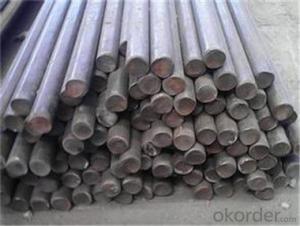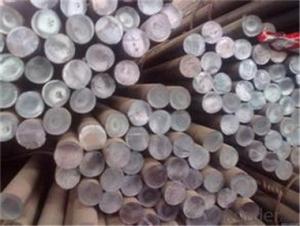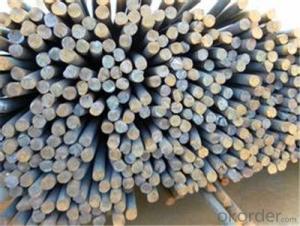Round Bars Manufacturer with Standard High Quality
- Loading Port:
- Hai Kou
- Payment Terms:
- TT OR LC
- Min Order Qty:
- 300 m.t.
- Supply Capability:
- 1000900 m.t./month
OKorder Service Pledge
OKorder Financial Service
You Might Also Like
Description of steel round bar:
Diamater:Ø12mm-Ø650mm
Length: standard 6m,9m,12m, If you need special lengths,please tell us.
Festures of steel round bar:
Inspection: 100% UT test, mill test certificate, third party inspection such as SGS,BV etc.
Packing: In bundle, tied by steel straps, covered with protecting film. Use wooden box, filled with foam to keep the surface from damaging ,scratches,crash etc.
Specifications of steel round bar:
Mainly used for engineering component, forging industries, foundation bolt, shafting etc
We also stock RINL make rounds from 16mm to 80mm in all the available grades
We also take special orders in EN8, EN9 or any other equivalent grade with specific dimensional requirements.The data given above in chart are indicative. Actual results may vary.
Images of steel round bar:
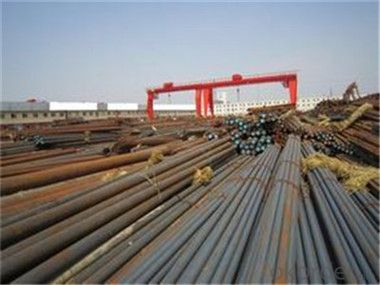
FAQ:
1. What is your package?
Packing situation: standard seaworthy packing or as customer required.
2. How long is the lead time?
Delivery time: 45 days after order confirmed.
3. What payment term do you accept?
Payment: T/T or L/C at sight.
- Q: Can steel round bars be used for making stabilizer bars?
- Yes, steel round bars can be used for making stabilizer bars. Steel is a commonly used material in the automotive industry due to its high strength, durability, and resistance to deformation. Stabilizer bars, also known as sway bars, are components in a vehicle's suspension system that help to reduce body roll and improve stability during cornering. These bars are subjected to significant forces and need to be able to withstand the load. Steel round bars provide the necessary strength and stiffness required for stabilizer bars to effectively perform their function. Additionally, steel is readily available and cost-effective, making it a popular choice for manufacturing stabilizer bars in the automotive industry.
- Q: What are the different types of steel used in manufacturing round bars?
- There are several types of steel used in manufacturing round bars, including carbon steel, alloy steel, stainless steel, and tool steel. Carbon steel is the most common type, known for its high strength and affordability. Alloy steel contains additional elements such as chromium, nickel, and molybdenum to enhance its properties like corrosion resistance and toughness. Stainless steel is highly resistant to corrosion and can withstand high temperatures, making it ideal for applications in the food and chemical industry. Tool steel is specifically designed for tools and dies, offering high hardness, wear resistance, and toughness.
- Q: What are the different surface hardness options for steel round bars?
- Steel round bars can have varying levels of surface hardness depending on the specific requirements and applications. Some of the different surface hardness options for steel round bars include: 1. Soft or annealed: This is the lowest level of surface hardness, where the steel is heated and then slowly cooled to reduce internal stress and increase ductility. Soft or annealed steel is easier to machine and form but has lower strength and wear resistance. 2. Normalized: Normalizing involves heating the steel to a specified temperature and then cooling it in air. This process refines the grain structure and improves the mechanical properties of the steel, resulting in increased hardness compared to annealed steel. 3. Quenched and tempered: This is a heat treatment process that involves heating the steel to a high temperature and then rapidly cooling it in a quenching medium like oil or water. The rapid cooling hardens the surface of the steel, while the subsequent tempering process reduces internal stresses and increases toughness. Quenched and tempered steel round bars have high hardness and strength, making them suitable for applications that require resistance to wear and impact. 4. Induction hardened: Induction hardening is a surface hardening process that involves heating only the surface of the steel round bar using an induction coil. This localized heating is followed by rapid quenching, resulting in a hardened surface layer with increased wear resistance. The core of the steel remains unaffected, retaining its toughness. 5. Case hardened: Case hardening, also known as carburizing, involves introducing carbon into the surface layer of the steel round bar. This is typically done by exposing the steel to a carbon-rich gas or by heating it with a carbon-containing material. The carbon diffuses into the surface and increases the hardness, while the core remains relatively softer. Case hardened steel round bars have a tough core with a wear-resistant surface. These are just a few of the different surface hardness options available for steel round bars. The choice of hardness will depend on the specific application requirements, such as strength, wear resistance, and toughness needed for the intended use.
- Q: How do you prevent rust on steel round bars?
- To prevent rust on steel round bars, you can apply a protective coating such as paint, oil, or a rust inhibitor. Regular cleaning and maintenance, including keeping the bars dry and free from moisture, can also help prevent rust formation.
- Q: What are the options for joining steel round bars?
- There are several options for joining steel round bars, depending on the specific requirements and applications. Some common methods include welding, bolting, and adhesives. 1. Welding: Welding is a widely used method for joining steel round bars. It involves melting the ends of the bars and fusing them together using a welding process such as arc welding, MIG welding, or TIG welding. Welding provides a strong and durable joint that can withstand high loads and stresses. 2. Bolting: Bolting involves using bolts, nuts, and washers to join steel round bars. Holes are drilled through the bars, and bolts are inserted through these holes. The nuts are then tightened to secure the bars together. Bolting is a relatively simple and quick method, and it allows for disassembly and reassembly if required. 3. Adhesives: Adhesives can also be used to join steel round bars. High-strength industrial adhesives are applied to the mating surfaces of the bars, which are then pressed together and left to cure. Adhesive bonding can provide a strong and durable joint, particularly in applications where welding or bolting may not be feasible or desired. 4. Mechanical couplings: Mechanical couplings are specifically designed for joining steel round bars. These couplings typically consist of two separate components that are fitted over the ends of the bars and tightened together using screws, clamps, or other mechanical means. Mechanical couplings provide a reliable and secure joint without the need for welding or drilling. 5. Cold forming: In some cases, steel round bars can be joined through cold forming techniques such as swaging or crimping. These methods involve mechanically deforming the ends of the bars to create a tight and secure joint. Cold forming is often used in applications where welding or other traditional methods are not suitable. It is important to consider the specific requirements, load-bearing capacities, and environmental conditions when selecting the appropriate method for joining steel round bars. Consulting with a professional engineer or welder can help determine the best option based on the specific application and desired outcome.
- Q: Are steel round bars suitable for high-pressure applications?
- Steel round bars are frequently a good choice for high-pressure applications. Steel is renowned for its strength and durability, making it an ideal material for handling high pressure. Round bars, in particular, possess exceptional tensile strength and resistance to deformation, rendering them suitable for utilization in high-pressure settings like hydraulic systems, oil and gas pipelines, and structural applications. Furthermore, steel round bars can be customized to meet specific strength and hardness criteria, further enhancing their aptness for high-pressure applications. Nevertheless, it is crucial to carefully consider the requirements of the particular application and seek advice from an engineer or industry expert to guarantee the selection of the most appropriate grade and size of steel round bar for optimal performance and safety.
- Q: How can steel round bars be protected from corrosion?
- There are various methods available for protecting steel round bars from corrosion. One common approach involves the application of a protective coating, such as paint or enamel. This coating acts as a barrier between the steel and the corrosive elements present in the environment, thereby minimizing the risk of corrosion. Another effective technique is the use of galvanization, which entails coating the steel round bars with a layer of zinc. Zinc, being a sacrificial metal, tends to corrode more readily than steel. Consequently, when the round bars come into contact with moisture or other corrosive substances, the zinc coating corrodes instead of the steel, providing an extra layer of protection. The utilization of stainless steel round bars is also highly effective in preventing corrosion. Stainless steel contains a significant amount of chromium, which forms a passive layer on the steel's surface. This passive layer acts as a shield, safeguarding the steel against corrosion caused by moisture or other corrosive agents. Regular maintenance and cleaning of the steel round bars are essential for preventing corrosion. Removing dirt, dust, and other contaminants from the surface helps to preserve the protective coating or passive layer if it exists. Additionally, keeping the round bars dry and storing them in a well-ventilated area can also aid in corrosion prevention. Proper handling and storage of steel round bars are equally important. Storing them in a dry and covered location prevents exposure to moisture and corrosive elements. It is also crucial to avoid contact with other metals or materials that can induce galvanic corrosion. By implementing these protective measures, steel round bars can be effectively shielded from corrosion, ensuring their longevity and structural integrity.
- Q: What are the advantages of using carbon steel round bars?
- The advantages of using carbon steel round bars include high strength and durability, excellent machinability, and cost-effectiveness. Carbon steel round bars are known for their superior tensile strength, making them suitable for heavy-duty applications. They are also highly resistant to wear and tear, ensuring long-lasting performance. Additionally, carbon steel round bars can be easily shaped and formed, making them ideal for machining processes. Lastly, carbon steel round bars are relatively affordable compared to other materials, providing a cost-effective solution for various industries.
- Q: What are the different grades of steel round bars?
- Steel round bars come in various grades, each with its own distinct properties and characteristics. Some of the most commonly used grades are as follows: 1. Mild Steel, also known as low carbon steel, is widely preferred due to its affordability and versatility. It has a relatively low carbon content and is easily weldable and malleable. 2. Carbon Steel has a higher carbon content compared to mild steel, resulting in increased strength and durability. It is commonly used in applications that demand high strength and hardness, such as construction and machinery. 3. Alloy Steel round bars are created by combining carbon steel with different elements like chromium, nickel, or molybdenum. This combination enhances the material's properties, such as improved corrosion resistance, toughness, and tensile strength. 4. Stainless Steel round bars are predominantly made of iron and contain at least 10.5% chromium. This grade of steel is renowned for its exceptional corrosion resistance and is commonly used in industries, such as food and pharmaceuticals, where cleanliness and hygiene are critical. 5. Tool Steel round bars are specifically designed to withstand high temperatures, heavy loads, and repetitive impacts. They possess excellent hardness, wear resistance, and toughness, making them ideal for manufacturing tools and dies. 6. High-Speed Steel (HSS) round bars, a type of tool steel, can maintain their hardness even at high cutting speeds. They find extensive use in cutting, drilling, and machining applications that require high speeds, such as the production of drills and milling cutters. These are just a few examples of the wide variety of steel round bar grades available. Each grade is tailored to meet specific requirements in different industries and applications. It is crucial to select the appropriate grade based on factors like strength, corrosion resistance, and desired properties for a particular project or usage.
- Q: Can steel round bars be used in the production of tools?
- Yes, steel round bars can be used in the production of tools. Steel round bars are commonly used in tool manufacturing due to their high strength, durability, and versatility. They can be shaped, machined, and heat-treated to create various types of tools such as drills, punches, chisels, and hammers. The use of steel round bars ensures that the tools have the necessary hardness and toughness required for their specific applications.
Send your message to us
Round Bars Manufacturer with Standard High Quality
- Loading Port:
- Hai Kou
- Payment Terms:
- TT OR LC
- Min Order Qty:
- 300 m.t.
- Supply Capability:
- 1000900 m.t./month
OKorder Service Pledge
OKorder Financial Service
Similar products
Hot products
Hot Searches
Related keywords
